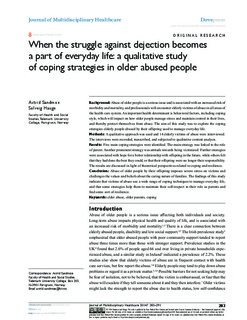| dc.description.abstract | Background: Abuse of older people is a serious issue and is associated with an increased risk of morbidity and mortality, and professionals will encounter elderly victims of abuse in all areas of the health care system. An important health determinant is behavioral factors, including coping style, which will impact on how older people manage stress and maintain control in their lives, and thereby protect themselves from abuse. The aim of this study was to explore the coping strategies elderly people abused by their offspring used to manage everyday life. Methods: A qualitative approach was used and 14 elderly victims of abuse were interviewed. The interviews were recorded, transcribed, and subjected to qualitative content analysis. Results: Five main coping strategies were identified. The main strategy was linked to the role of parent. Another prominent strategy was attitude towards being victimized. Further strategies were associated with hope for a better relationship with offspring in the future, while others felt that they had done the best they could, or that their offspring were no longer their responsibility. The results are discussed in light of theoretical perspectives related to coping and resilience. Conclusion: Abuse of older people by their offspring imposes severe stress on victims and challenges the values and beliefs about the caring nature of families. The findings of this study indicate that victims of abuse use a wide range of coping techniques to manage everyday life, and that some strategies help them to maintain their self-respect in their role as parents and find some sort of resilience. | |

